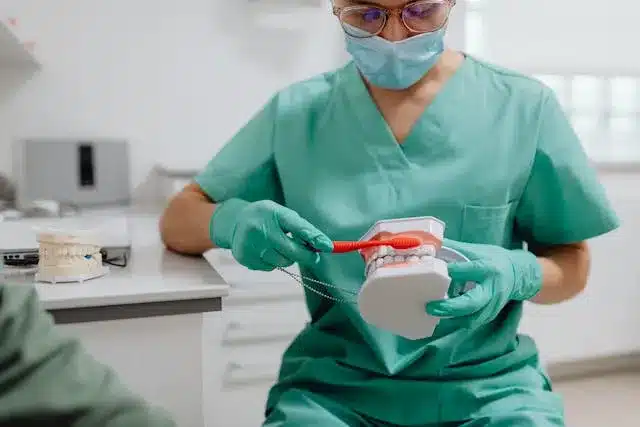Oral health is often oversimplified as brushing twice a day and flossing regularly. While these habits form the foundation of dental care, maintaining healthy teeth and gums requires a more comprehensive understanding of how teeth function, what damages them, and how to protect them over time.
Scientific research and clinical experience have highlighted additional strategies that go beyond basic hygiene. Implementing these approaches can help prevent decay, gum disease, and other long-term complications.
Also Read: Why Prioritizing Mental Health Should Be Part of Every Wellness Plan
Understanding the Complexity of Teeth and Gums
Teeth are not uniform structures; each tooth consists of multiple layers, including enamel, dentin, and pulp. Enamel is the hardest material in the human body and serves as a protective barrier against decay and wear. Beneath enamel, dentin is less dense and more sensitive, transmitting sensations to the pulp, which contains nerves and blood vessels. Damage that penetrates the enamel into dentin can lead to sensitivity and increased susceptibility to cavities.
Gums also play a critical role in oral health. Healthy gums form a tight seal around teeth, preventing bacteria from penetrating the underlying bone. Gum disease, or periodontal disease, occurs when bacterial plaque accumulates along the gumline, triggering inflammation, tissue breakdown, and even bone loss. Understanding this interplay between teeth and gums helps individuals appreciate why advanced preventive strategies are necessary.
Nutrition and Oral Health
Diet significantly influences dental health. Frequent consumption of sugary and acidic foods increases the risk of enamel erosion and cavities. Sugar fuels oral bacteria, which produce acids that demineralize teeth. Acidic beverages, including soft drinks, citrus juices, and some sports drinks, can gradually wear away enamel.
Conversely, certain nutrients actively support oral health. Calcium and phosphate strengthen enamel, while vitamins such as vitamin D aid in calcium absorption. Crunchy vegetables like carrots and celery stimulate saliva production, which neutralizes acids and mechanically cleans teeth. Limiting snacking between meals allows saliva to restore oral pH, further protecting teeth from decay.
Saliva: The Underestimated Protector
Saliva is often overlooked, but it serves several essential functions for oral health. It neutralizes acids, washes away food debris, and contains enzymes that begin the digestion of carbohydrates. Reduced saliva flow, which can result from certain medications, dehydration, or medical conditions like Sjögren’s syndrome, increases the risk of tooth decay and gum disease. Strategies to maintain saliva production include staying hydrated, chewing sugar-free gum, and discussing potential side effects of medications with a healthcare provider.
Modern Brushing and Flossing Techniques
Even daily brushing can be ineffective if done incorrectly. Dentists recommend using a soft-bristled toothbrush and brushing at a 45-degree angle to the gumline. This technique removes plaque while avoiding damage to enamel and gums. Brushing should last for at least two minutes, covering all tooth surfaces. Electric toothbrushes have been shown to remove more plaque than manual brushes in some studies, particularly in hard-to-reach areas.
Flossing is equally critical. Traditional dental floss removes plaque and food particles from between teeth, where a toothbrush cannot reach. Interdental brushes or water flossers are effective alternatives for individuals who struggle with conventional flossing. Consistency is key; skipping flossing can allow plaque to accumulate, leading to gum inflammation and cavities.
The Role of Preventive Dental Visits
Regular dental check-ups allow for early detection of issues before they escalate. Professional cleanings remove hardened tartar that cannot be eliminated through brushing alone. During exams, dentists assess teeth, gums, and oral tissues for signs of disease or damage. Preventive treatments such as fluoride applications, dental sealants, and early-stage cavity fillings reduce the risk of more invasive procedures later.
Patients seeking guidance on comprehensive preventive care can benefit from consulting an experienced South Yarra dentist, who can create a tailored plan that considers individual risk factors, lifestyle, and oral anatomy. These professionals can recommend the most appropriate combination of hygiene practices, dietary adjustments, and preventive treatments.
Addressing Habitual Risks
Certain habits can silently compromise oral health. Teeth grinding, or bruxism, wears down enamel, increases sensitivity, and may lead to jaw pain. Custom night guards, often prescribed by dentists, help mitigate this damage. Nail-biting, chewing hard objects, and using teeth as tools can also cause fractures or chips. Smoking and tobacco use are strongly associated with gum disease, tooth staining, and increased risk of oral cancers. Awareness and modification of these behaviors are crucial for maintaining long-term dental health.
Technology and Modern Dentistry
Advancements in dental technology have improved the ability to prevent and treat oral conditions. Digital imaging allows for precise assessment of tooth structure, bite alignment, and early-stage cavities. Laser treatments can target diseased gum tissue with minimal discomfort and promote faster healing. 3D printing enables the creation of precise crowns, bridges, and orthodontic appliances. Even artificial intelligence is being integrated into dental care to predict patient-specific risks and optimize treatment planning.
Holistic Oral Health Strategies
Optimal oral health is achieved when hygiene, nutrition, lifestyle, and professional care are integrated. Establishing a consistent brushing and flossing routine, maintaining a balanced diet, protecting teeth during physical activity, and attending regular dental check-ups are all part of a comprehensive strategy. Patients with complex dental histories or cosmetic goals benefit from personalized advice from qualified dentists who can assess risks, monitor changes, and provide interventions when necessary.
Beyond the Mouth: Systemic Connections
Oral health impacts overall health. Gum disease has been linked to cardiovascular disease, diabetes management, and adverse pregnancy outcomes. Poor oral hygiene can contribute to systemic inflammation, which affects multiple organs. Maintaining healthy teeth and gums is therefore not only about preserving a smile—it’s a critical component of overall well-being.
Final Thoughts
Maintaining optimal oral health extends far beyond basic brushing and flossing. Nutrition, saliva production, habit management, preventive care, and technological advancements all play significant roles in protecting teeth and gums. A holistic approach ensures that oral health supports both functional and aesthetic goals while contributing to overall health. Consulting an experienced South Yarra dentist provides guidance on personalized strategies, preventive measures, and advanced treatments, helping individuals safeguard their smile for years to come.




